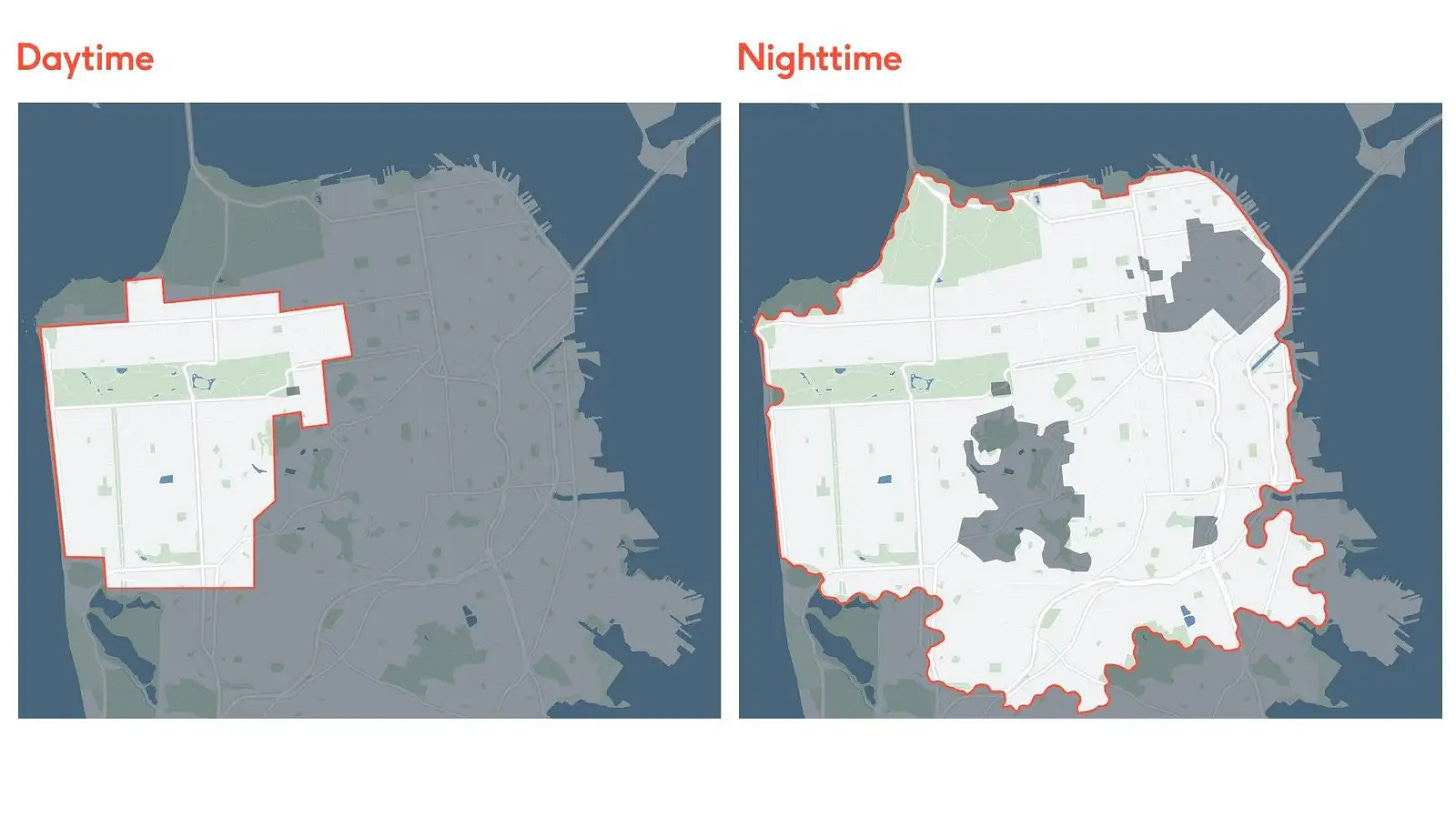Heya friends, happy Friday!
Apologies for the delay in writing these last two weeks, have been *busy* and *full of change*. This is going to be a long edition, with a sprinkling of interesting links as well as my usual commentary. For those of you who are new here, welcome! My name is Sarah and despite writing a newsletter for over four years, typos haunt me in my wake. Hope you enjoy the content, typos and all.
Hot tip: For those of you mobility nuts, I’ve also recently subscribed to and am loving Ali Griswold’s Oversharing Newsletter. It is about wider sharing economy— featuring some hot and spicy takes on shared mobility in particular. If you’re not already in the loop, it’s a great, opinionated read with a lot of heart and wit behind it. 20/10 recommend a paid subscription as they are currently on sale through the end of the year!
Ok, onto le news!
Read of the Week
America’s devastating relationship with traffic fatalities
The charts in this article aptly demonstrate how America’s continued increase in traffic fatalities compares with the other countries, and the results make me 😵💫. The clarity of it all really hits: we have a roadway network that promotes death. We have solutions today to fix this, and across multiple levels of government we’ve shown that human life is the cost we’re willing to pay for car culture. It is disheartening and disturbing.
“In 2021, nearly 43,000 people died on American roads, the government estimates. And the recent rise in fatalities has been particularly pronounced among those the government classifies as most vulnerable — cyclists, motorcyclists, pedestrians.” Important to note that people who bike and walk are also essential in our fight against climate change, with transportation being the #1 contributor of GHG emissions in the US.
Fighting for safer streets in America
Very related to the above, is a heart-breaking article from Vox about Allison Hart, a five year old who was killed in Washington, DC after a driver killed her. If you’re looking for a cathartic cry, well then this is the article for you. It’s sad, depressing, and a reminder about what exactly is at stake: human life. It’s also a reminder why groups like Families for Safer Streets matter so much.
“Part of what’s so frustrating to her is that the solutions that could save lives — making streets and vehicles safer, and finding ways to get drivers to slow down — are already known. It’s hard to know what exactly to do when your little girl is killed in a way that so many others are each year, and when everyone continues to move on with their lives as though everything is normal. It will never be normal for Jessica. She isn’t a professional activist. Still, she’s committed to doing whatever she can to make sure Allie isn’t forgotten and that the crisis of road deaths isn’t ignored anymore.”
Government and Policy
London to expand Ultra Low Emission Zone
Can I get a woop-woop? London is expanding their Ultra Low Emission Zone (ULEZ), helping to reduce the usage of older, more polluting cars in the Capital beginning in August 2023. The plan is expected to bring cleaner air to 5 million more Londoners by charging drivers £12.50 a day for driving said older vehicles around town. Revenue from the program will provide funding for more sustainable modes of transportation including buses, bikes, and walking. TfL has even introduced a £110m “scrappage scheme” to help vulnerable people and small businesses with the change, while also introducing more buses in lower density areas.
US adds Chinese AVs to list of National Security Threats
Meanwhile, I’m just sitting over here thinking about how cars have *always* been a threat to society, but I digress.
The opening intro this article states that “amid rising concerns about China’s growing international data collection apparatus, a newly divided US Congress is applying fresh scrutiny to the possibility that imported Chinese technology could be a Trojan horse.” The concern is that cars will be spying on us, and given that cities like SF already use camera footage from AVs to inform police investigations… this seems like a very obvious threat? We will see how this one pans out!
Seoul launches autonomous buses
The Seoul government partnered with 42Dot, a South Korean based autonomous bus start-up, to launch their first ever autonomous bus service. It is very telling to me that here in San Francisco I encounter AVs all the time: all designed for private transportation. Yet abroad, many cities are prioritizing more sustainable entries for AVs by bringing the technology to their public transport systems. Le sigh.
The more you know!
EU approves France’s flight ban for trips that could happen within 2.5 train trips (Politico)
Seattle, WA has a permit to introduce AVs to city streets (GeekWire)
Berlin wants to put bike and scooter parking on the roadway, where cars are typically parked, and increase the cost of car parking (Bloomberg)
Industry
Cruise plans majors expansions for 2023
Cruise—a company that experienced numerous dangerous server crashes this year—is naturally expanding their service. They will start in Austin and Phoenix, and then set their horizons onto new landscapes. The hope is that the vehicles will transition to the Blue Origin model in 2023, bringing a purpose-built shared and electric AV to city streets.
The company also just started providing day-time AV service in San Francisco to a smaller portion the overall service area (Jalopnik). Riders will be charged for these trips.
Tesla releases Full Self-Driving mode to all of America
Just another day living in Elon Musk’s delusion. Tesla has made Full Self-Driving (FSD) Beta available to all Tesla owners in North America, despite the fact that (a) the name is misleading and (b) the technology leads to drivers being less present behind the wheel and not focusing to the point of collision. For a cool $15k you too can equip your Tesla with a misrepresented program that puts you in danger, and *still* doesn’t have regulatory approval!
In November, a Zoox AV based out of Las Vegas rear-ended a tractor trailer. According to the company, wasn’t in autonomous driving at the time of the collision. “Police noted the driver said she was in control of the vehicle at the time of the crash, despite her expectation that the vehicle would stop on its own.”
The more you know!
Apple is delaying the launch of their autonomous car until 2026 [Bloomberg]
Kodiak is awarded $50m deal with US Army to develop “robotic combat vehicles”, which is ironic because cars already kill with very little effort [The Verge]
A look into Aicha Evans, CEO of Amazon’s Zoox, vision for the future of AVs [FastCo]
AV company Nuro is the latest Silicon Valley mobility tech company to experience layoffs [The Verge]
Investors are losing patience with the slow pace of AV development (it’s almost like they don’t actually care about safer transportation networks) [WSJ]
Research and Academia
Converting parking lots to parks
I am unofficially calling this The Joni Mitchell Research Paper à la “they paved paradise and put up a parking lot.”
“Nature-based solutions (NBS) are recognised as a means to address challenges such as heatwaves, flooding and biodiversity loss. Delivering these benefits at scale will require large areas of scarce urban land to be converted into green space. Here we show an approach by which cities can make substantial progress towards their sustainability targets using NBS, by converting redundant street parking into biodiverse green space.”
Measuring transit ridership and equity in Ontario
“Building an accurate model of travel behaviour based on individuals’ characteristics and built environment attributes is of importance for policy-making and transportation planning. Recent experiments with big data and Machine Learning (ML) algorithms toward a better travel behaviour analysis have mainly overlooked socially disadvantaged groups.. Our findings reveal the great potential of ML algorithms for enhanced travel behaviour predictions for low-income strata without considerably sacrificing interpretability.”
The potential of electric cargo bikes
“One of the reasons that citizens depend on their private cars is using this mode for carrying parcels, shopping, and transporting children. However, new electrized mobility modes like electric cargo bikes (e-cargo bikes) can provide mobility services to decrease citizens' car dependency. Recently, their share in the modal splits of cities has been increasing through technological advancement, infrastructure development, and government support in some countries. This paper aims to provide a comprehensive and international review of the role of e-cargo bikes in urban transportation.”
Extra Bits + Bobs
Jobs you should apply for!
Micromobility.io compiles a list of micromobility-related jobs that need to be done! You can see the open list of jobs here.
The UK’s Department for Transport (DfT) has a new executive agency called Active Travel England, and they are hiring! Their focus is on walking, rolling, and wheeling. According to AFTR reader Chris, “they have the first of many roles open looking for lead developers, data engineers, front/back end and data scientists—to create the data, tools and models that will be a game changer to the sector (and making them open source).” Yay! Please go apply!
That’s all from me. Have a beautiful weekend friends.
Sarah
P.S. I am still requesting donations for the San Francisco Bicycle Coalition to reach my target of $5,000 by the end of the year! Please consider donating and making my day!!





